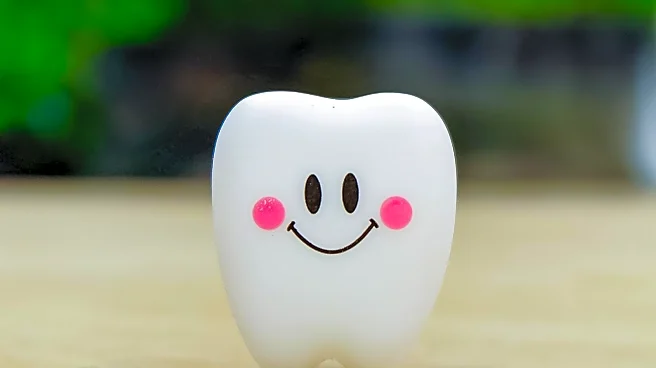What's Happening?
A study conducted by the University of Campinas has explored the protective role of ellagic acid in dental adhesive interfaces following tooth whitening procedures. The research involved freshly extracted
human molars, which were subjected to different treatments, including immediate whitening and restoration, and whitening followed by ellagic acid application. The study aimed to assess the bond strength of dental adhesives over time, with samples stored for either 24 hours or 12 months. The findings indicated that ellagic acid application helped maintain bond strength, particularly after prolonged storage, compared to other groups. The research utilized scanning electron microscopy to visualize nanometric spaces within the hybrid layer, providing insights into the structural integrity of the adhesive interface.
Why It's Important?
The study's findings have significant implications for dental practices, particularly in enhancing the longevity and effectiveness of dental restorations post-whitening. Ellagic acid's ability to preserve bond strength over time could lead to improved patient outcomes, reducing the need for frequent dental repairs and interventions. This research contributes to the broader field of dental materials science, offering a potential solution to common issues faced in adhesive dentistry. By improving the durability of dental restorations, the study supports advancements in patient care and could influence future dental treatment protocols.
What's Next?
Further research may be conducted to explore the application of ellagic acid in other dental procedures and its long-term effects on different types of dental materials. The study opens avenues for developing new adhesive formulations incorporating ellagic acid, potentially leading to commercial products that enhance dental restoration longevity. Dental professionals and researchers might collaborate to test these formulations in clinical settings, assessing their effectiveness and safety in real-world applications.
Beyond the Headlines
The use of ellagic acid in dental treatments also raises questions about the ethical sourcing and sustainability of such compounds. As the demand for improved dental materials grows, considerations regarding the environmental impact and ethical production of these substances become increasingly relevant. Additionally, the study highlights the importance of interdisciplinary research, combining materials science, chemistry, and dentistry to address complex challenges in healthcare.









